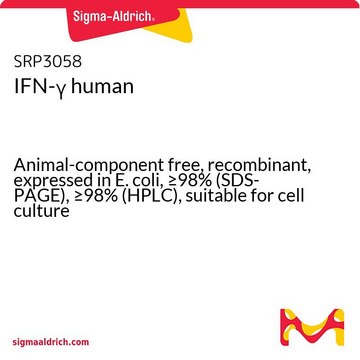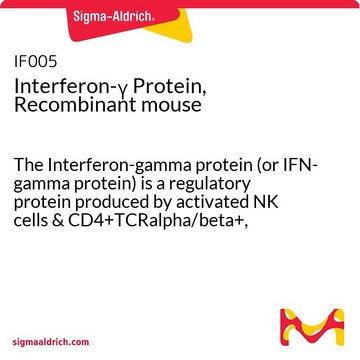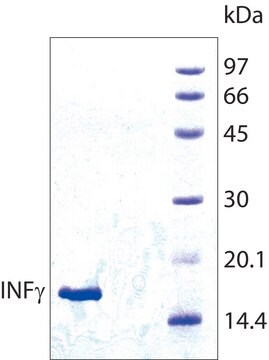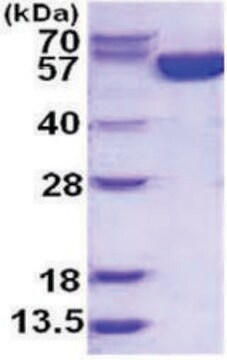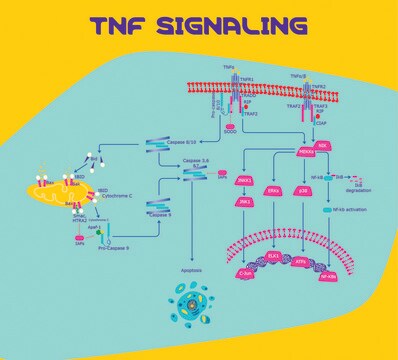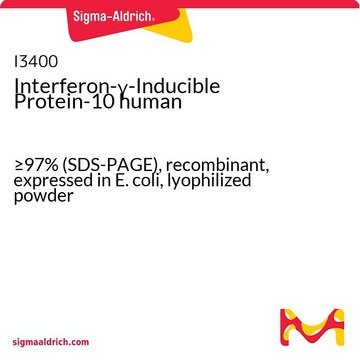추천 제품
일반 설명
Interferon-γ (IFN-γ) is a pleotropic cytokine, encoded by the gene mapped to human chromosome 12q15. It is a non-covalent homodimer with two identical 17kDa polypeptide chains. It belongs to the type II class of interferons.
Recombinant human Interferon-γ (IFN-γ) is expressed in human 293 cells as a glycoprotein with a calculated molecular mass of 16 kDa. This protein is manufactured in human cells using an all-human production system, with full chemically defined ingredients and with no serum. The human cells expression system allows human-like glycosylation and folding, and often supports better stability of the protein in culture. The bioactivity of IFN-γ expressed in human 293 cells is significantly higher compared to bacterially expressed IFN-γ.
애플리케이션
Interferon-γ human has been used in cytometric bead array to measure the levels of interferon-γ in the sample.
It has also been used for cytokine treatment of human islets to evaluate the activation of hypoxia inducible factor 1 α (HIF1α) targets, in vitro.
생화학적/생리학적 작용
IFN-γ is a dimerized soluble cytokine that is the only member of the type II class of interferons.
Interferon-γ (IFN-γ) plays an essential role in function of virtually all immune cells and both innate and adaptive immune responses. IFN-γ exhibits various biological effects, such as antiviral activity, inhibition of cell or tumor growth and promotion of terminal differentiation of B cells into immunoglobulin-producing cells. This cytokine also activates macrophages, increases cytotoxicity of natural killer cells and promotes T cell cytotoxicity. In addition to antiviral activity, recombinant human IFN-γ is a potent modulator of immune responses and modifies cellular processes.
Interferon-γ (IFN-γ) plays an essential role in function of virtually all immune cells and both innate and adaptive immune responses. IFN-γ exhibits various biological effects, such as antiviral activity, inhibition of cell or tumor growth and promotion of terminal differentiation of B cells into immunoglobulin-producing cells. This cytokine also activates macrophages, increases cytotoxicity of natural killer cells and promotes T cell cytotoxicity. In addition to antiviral activity, recombinant human IFN-γ is a potent modulator of immune responses and modifies cellular processes.
서열
QDPYVKEAENLKKYFNAGHSDVADNGTLFLGILKNWKEESDRKIMQSQIVSFYFKLFKNFKDDQSIQKSVETIKEDMNVKFFNSNKKKRDDFEKLTNYSVTDLNVQRKAIHELIQVMAELSPAAKTGKRKRSQMLFRG
물리적 형태
Supplied as a lyophilized powder containing phosphate buffered saline.
분석 메모
The biological activity of recombinant human IFN-γ was tested in culture in a viral resistance assay. The ED50 is defined as the effective concentration of IFN-γ that allows 50% cell growth in an antiviral cell based bioassay.
Storage Class Code
11 - Combustible Solids
WGK
WGK 2
Flash Point (°F)
Not applicable
Flash Point (°C)
Not applicable
시험 성적서(COA)
제품의 로트/배치 번호를 입력하여 시험 성적서(COA)을 검색하십시오. 로트 및 배치 번호는 제품 라벨에 있는 ‘로트’ 또는 ‘배치’라는 용어 뒤에서 찾을 수 있습니다.
이미 열람한 고객
Clinical use of interferon?γ.
Miller C H, et al.
Annals of the New York Academy of Sciences, 1182(1), 69-79 (2009)
The IFNγ receptor: a paradigm for cytokine receptor signaling.
Bach E A, et al.
Annual Review of Immunology, 15(1), 563-591 (1997)
Class II cytokine receptors and their ligands: key antiviral and inflammatory modulators.
Renauld J C.
Nature Reviews: Immunology, 3(8), 667-667 (2003)
Expression and reconstitution of a biologically active mouse interferon gamma receptor in hamster cells. Chromosomal location of an accessory factor.
Hibino Y, et al.
The Journal of Biological Chemistry, 266(11), 6948-6951 (1991)
David A Constant et al.
ImmunoHorizons, 6(7), 416-429 (2022-07-06)
The three types of IFN have roles in antimicrobial immunity and inflammation that must be properly balanced to maintain tissue homeostasis. For example, IFNs are elevated in the context of inflammatory bowel disease and may synergize with inflammatory cytokines such
자사의 과학자팀은 생명 과학, 재료 과학, 화학 합성, 크로마토그래피, 분석 및 기타 많은 영역을 포함한 모든 과학 분야에 경험이 있습니다..
고객지원팀으로 연락바랍니다.